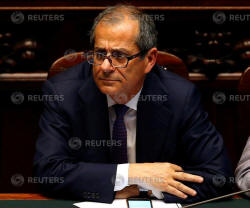Italy raises deficit target, defies EU and rattles
markets
 Send a link to a friend
Send a link to a friend
 [September 28, 2018]
By Gavin Jones and Alberto Sisto [September 28, 2018]
By Gavin Jones and Alberto Sisto
ROME (Reuters) - Italy's new government
proposed a 2019 budget with a deficit three times bigger than the
previous administration's target, setting up a clash with the European
Commission and sparking a sell-off of state bonds.
Italy has the heaviest debt burden among big European Union economies,
at 131 percent of gross domestic product. It is under pressure from the
EU to rein in spending amid fears it could sow the seeds of a debt
crisis in the euro zone.
Late on Thursday night, the four-month-old government proposed a budget
that would target a deficit of 2.4 percent of GDP for the next three
years. The spending would fund more welfare spending, tax cuts and a
boost to public infrastructure investment.
It marked a victory for the ruling parties over Economy Minister
Giovanni Tria, an unaffiliated technocrat whom investors had considered
a comparative fiscal conservative.
Tria had wanted a deficit as low as 1.6 percent of GDP next year, hoping
to meet EU demands that Italy progressively reduce the fiscal gap to
rein in its debt.
The euro slumped on the news overnight, then recovered. Italian bonds
were set for their worst day in over three months and banking shares
swooned, though fears of a selloff were avoided.

"They seem to be on a collision course with Brussels," said ING rates
strategist Martin van Vliet.
A deficit of 2.4 percent of GDP remains under the 3.0 percent ceiling
prescribed by EU rules, but Italy had promised Brussels it would cut the
deficit to reduce its huge debt.
Nothing would be gained from a clash with Italy, European Economics
Commissioner Pierre Moscovici said, but he added, "We don't have any
interest either that Italy does not respect the rules and does not
reduce its debt, which remains explosive."
Italian Deputy Prime Minister Luigi Di Maio retorted that the new budget
would spur economic growth, boost revenues and allow the debt to fall as
a percentage of output.
The European Commission said on Friday it would assess the budget plan,
along with those of other euro zone members, in the weeks after their
formal presentation by Oct. 15.
Rome will "press ahead" even if Brussels rejects the budget, said
Italy's other deputy prime minister, Matteo Salvini.
Di Maio leads the anti-establishment 5-Star Movement and Salvini the
right-wing League. The two parties took power in June, promising to
slash taxes and ramp up spending on welfare.
[to top of second column] |

Italian Economy Minister
Giovanni Tria attends as Prime Minister Giuseppe Conte (unseen)
speaks during his first session at the Lower House of the Parliament
in Rome, Italy, June 6, 2018. REUTERS/Tony Gentile/File Photo

Alberto Bagnai, a prominent League lawmaker close to Salvini, advised the EU
against a battle with Rome while it dealt with Britain's exit from the bloc.
"If it wants to open a second front in Italy, then be my guest," he said in a
radio interview.
The budget also risks running afoul of ratings agencies, which were waiting for
Italy's fiscal plans before reconsidering their ratings on Italy's sovereign
debt. Moody's, which has a negative outlook on Italy's Baa2 rating, said it
would pass judgment by the end of October.
KEEPING PROMISES
Salvini and Di Maio had pushed Tria to increase the deficit sharply to fund
their campaign promises. Tria had been holding out for something below 2.0
percent. The previous administration had targeted a deficit of 0.8 percent of
GDP in 2019 and a balanced budget in 2020.
Last year's deficit came in at 2.4 percent of GDP and this year's was set at 1.6
percent, although it's unclear whether the 2018 goal will be maintained.
Tria has not commented, but Di Maio and other government officials said he had
no intention of resigning. Salvini said on Friday Tria's position had "never
been in doubt."
Di Maio said the 2019 budget, which must be presented by Oct. 20, will set aside
10 billion euros ($11.6 billion) for 5-Star's flagship "citizens' income" of up
to 780 euros per month for 6.5 million poor Italians.
He said it will also include 15 billion euros of public investment. Prime
Minister Giuseppe Conte promised "the biggest program of public investments ever
carried out in Italy."
Salvini said the budget would also allow people to retire earlier, opening about
400,000 jobs for the young, and cut tax rates for a million self-employed
workers.
($1 = 0.8609 euros)
(Additional reporting by Angelo Amante, Giuseppe Fonte and Giselda Vagnoni in
Rome; Abhinav Ramnarayan in London; Sara Rossi in Milan and Leigh Thomas in
Paris; editing by Mark Bendeich, Larry King)
[© 2018 Thomson Reuters. All rights
reserved.] Copyright 2018 Reuters. All rights reserved. This material may not be published,
broadcast, rewritten or redistributed.
Thompson Reuters is solely responsible for this content. |